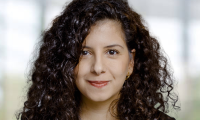Amani Meaidi
Medical abortion and contraception safety studies
Amani Meaidi has been awarded the Lundbeck Foundation's Talent Prize 2023 for her research in medical abortion safety and procedures, which culminated in an evidence-based e-learning course for gynaecologists, and significant improvements in the standard of care.
The safety of medical abortion and medical contraception, such as hormonal intrauterine devices, has until now been an under-researched field, largely disregarded by medical science. But Amani Meaidi, a medical doctor and postdoctoral researcher at the Danish Cancer Society, is in the process of changing that. She says:
‘I do research in the safety of medical birth control and surgical procedures specific to women. As such, I’ve set myself apart from many colleagues researching the efficacy of medical birth control. On top of that, I’ve set my sights on gynaecology, where there are gaps to fill, given that the female body has historically been neglected by medical research.’
For her research achievements in the safety of medical abortion, and in recognition of her striking results, Dr Meaidi has now been awarded the Lundbeck Foundation Talent Prize 2023.
Medical abortion, commonly known as the “abortion pill”, basically involves two kinds of pills; one to stop the pregnancy from continuing to develop, and one to cause the uterus to eject the foetus. Although simple in theory, even as an undergraduate, Dr Meaidi questioned what she was seeing in practice:
‘I was concerned by how many women were undergoing a surgical procedure after a medical abortion, since that is not the aim at all,’ says Meaidi. She goes on to explain:
‘In Denmark, when we recommend medical abortion to women seeking to terminate a pregnancy at an early stage, the whole idea is to avoid the general anaesthetic and greater risk of pelvic infection involved in surgical abortion.’
Lack of clinical insight
Later, Dr Meaidi wondered why the number of women undergoing a surgical procedure after a medical abortion differed from one clinic to the next. Especially given that physicians prescribe the same medication and follow the same guidelines nationwide. This led Meaidi to investigate whether the disparity might be due to some unknown risk factors in the procedure, but no evidence of this could be found.
Ultimately, however, Meaidi discovered that the problem was down to a lack of clinical insight into the condition of the uterus after a medical abortion, for example. To remedy this, in collaboration with the Capital Region of Denmark, she compiled an evidence-based e-learning course for health professionals providing abortion care in Denmark (see Fact Box).
‘So far, 500 gynaecologists and nurses working within gynaecology have taken the course, and this has resulted in a 60 per cent reduction in the number of surgical procedures following medical abortions,’ she says, pleased by this outcome.
Dr Meaidi explains that she is personally driven by a desire to help people, which is why she is also keen to know if the medical care she offers her patients is as risk-free as possible.
To that end, she has now also embarked on research in the safety of hormonal contraception, having previously demonstrated a side effect in terms of increased risk of ectopic pregnancy for women who fall pregnant despite having a hormonal intrauterine device (IUD).
‘My mission is to map all the unwanted effects of hormonal contraception, which led me to co-found “Safe Choice”. In this national project we surveyed one million women in Denmark for their experience with hormonal contraception,’ says Meaidi, who is eager to see the results of the study, which also maps unwanted effects through access to Danish healthcare registries.
‘My dream is to be able to give my female patients advice on the safest and most effective contraception for them personally, based on their age and health status. All on a sound and well-documented basis.’
The course is aimed at gynaecologists, who gain insights on:
- The natural course of bleeding and pain following medical abortion. With these insights, gynaecologists can prepare women for what to expect in terms of blood loss and pain duration and level.
- Interpretation of ultrasound scans of the uterus following medical abortion. This is presented in the form of patient case studies and images showing the condition of the uterus following medical abortion in cases where no surgical intervention is needed.
Source: Amani Meaidi, MD, postdoc, Danish Cancer Society.
